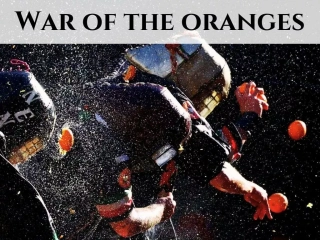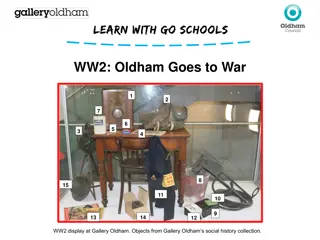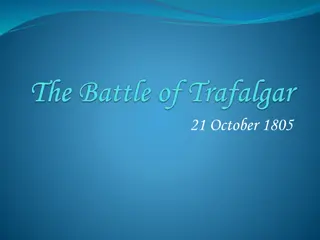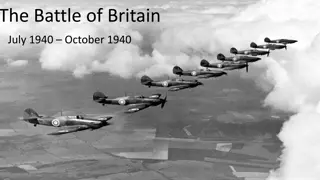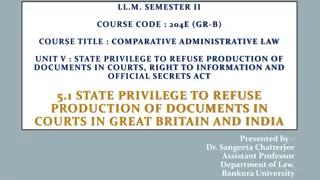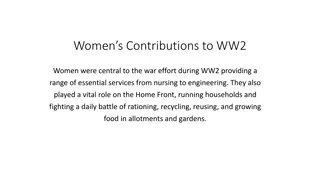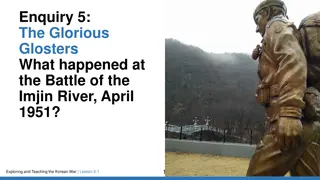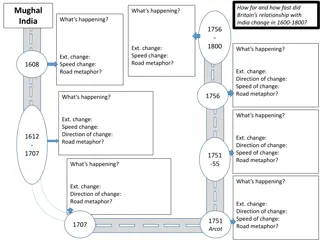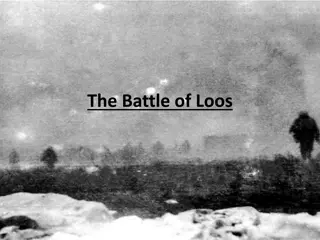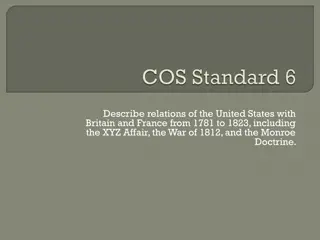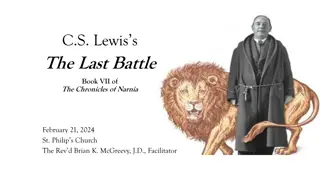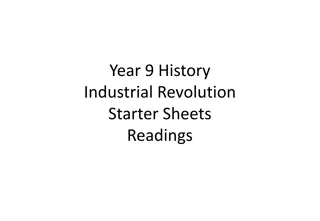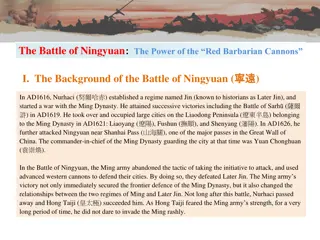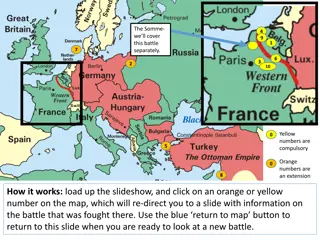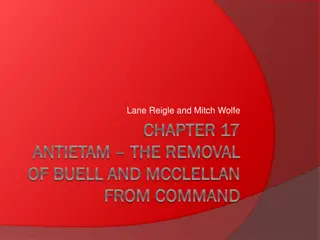Understanding the Battle of Britain in WW2
Explore the Battle of Britain in WW2, including the importance of codes, the strengths and weaknesses of the German and British air forces, Operation Sea Lion, and the defense strategies of France. Delve into the factors that led to the outcome and assess the key elements that shaped this historic battle.
Download Presentation

Please find below an Image/Link to download the presentation.
The content on the website is provided AS IS for your information and personal use only. It may not be sold, licensed, or shared on other websites without obtaining consent from the author. Download presentation by click this link. If you encounter any issues during the download, it is possible that the publisher has removed the file from their server.
E N D
Presentation Transcript
Wednesday, 17 July 2024 LESSON TITLE: Who won the Battle of Britain? A B C D E F G H I J K L M The code: 2/^:!0}2> {^! =}2> ! 3 $ % ^ 5 * 1 } 5 + = < N O P Q R S T U V W X Y Z > 2 / @ : { 0 ( ? 4 & - 3!00=^ 25 3:}0!}> Crack the code using the table above. Why do you think codes might have been important during WW2? Explain your answer in a full sentence.
Who won the Battle of Britain? Use what you know about the strengths and weaknesses to assess why the winning side won Explain the strengths and weaknesses of the German and British air forces Mastering Securing Developing Describe what the Battle of Britain was
Operation Sea Lion After the defeat of France in 1940, Germany believed Britain would ask for terms. However, Britain rejected Hitler s final offer of peace in July 1940. Germany, therefore, made plans to invade Britain Operation Sea Lion. However, because the Germans failed to win the Battle of Britain, Operation Sea Lion could not take place.
What did France do to defend itself? Watch the video about the defeat of France and answer the questions on the sheet. 1. What was the Battle of Britain considered to be? 2. How many aircraft did the Germans have? 3. How many aircraft did the British have? 4. When did the battle take place? 5. Who lost the most men? Click the picture above to load the video 6. How many Germans were captured? 7. How many planes did the Germans lose? 8. What was the result?
What did France do to defend itself? How many answers did you correctly get? 1. What was the Battle of Britain considered to be? The largest air battle anyone has ever seen. 2. How many aircraft did the Germans have? 2550 1964 3. How many aircraft did the British have? July October 1940 4. When did the battle take place? 5. Who lost the most men? Germany 925 6. How many Germans were captured? 1977 7. How many planes did the Germans lose? It was Germanys first major defeat. 8. What was the result?
1 German advantage British advantage Task: On the next slide you will find a worksheet full of boxes. The boxes are about the Battle of Britain. 1. 3000 pilots fought against the Germans in the Battle of Britain. Over 2000 were from Britain but they were joined by pilots from New Zealand, Poland, Canada, Czechoslovakia, South Africa etc. You need to sort them into German advantage and British advantage. Use the key provided to do this. Now sort the boxes into the below categories. You need to create the last category for the boxes that don t fit into the other three. 2 Training and pilots Planes New inventions
The below boxes are about the Battle of Britain. You need to sort them into German advantage and British advantage. 1 2 Training and pilots New inventions German advantage British advantage Planes 1. 3000 pilots fought against the Germans in the Battle of Britain. Over 2000 were from Britain but they were joined by pilots from New Zealand, Poland, Canada, Czechoslovakia, South Africa etc. 2. The Germans had 824 fighter planes and 1017 bombers. Britain only had 600 fighter planes. 3. It took the Germans 5 minutes to cross the English channel from France. However it took 15 minutes for British planes to take off and reach the German planes coming in when they had been spotted. 4. Many of the British pilots were part timers and had not received the same level of training or experience as the Germans. 5. The Germans trained 800 new pilots per month. The British trained just 200. 6. Speed in mph of the different planes: British Hawker Hurricane 325 mph, Supermarine Spitfire 326 mph German Messerschmitt ME109 357 mph, Messerschmitt ME110 349 mph, Heinkel HE111 247 mph. 7. The British Supermarine spitfire is one of the most famous planes in the world. It was fast, handled well and was more than a match for the German fighter planes. In comparison the German Heinkel was slow, not well armed (didn t have machine guns on it) and the glass cockpit did not protect the pilot. 8. The German Messerschmitt ME110 had four machine guns and two canons in the nose of the aeroplane and one machine gun in the cockpit. The British spitfire had 8 machine guns in the wings of the plane. 9. The German Messerschmitt ME110 could fly long distances but was slow and clumsy. 10. The German Messerschmitt ME109 was a fast shark-like plane, with a bright yellow nose. It was the most deadly and feared of all the German planes. 11. The two British planes only carried a pilot. The German planes had a pilot, gunner and bomb aimer. 12. By the end of August 1940 the RAF was only days away from defeat. Its airfields were badly damaged and it did not have enough pilots. 13. However, the British made a great invention the radar. This meant that they could detect German planes before they reached Britain. 14. 51 radar stations directed British pilots to the attacking Germans in a matter of minutes. This left them enough fuel to attack the German planes, over and over again. 15. The Germans were only making 150 new planes per month the British were producing over 550. 16. On the 15th September at 2pm Winston Churchill the British Prime Minister asked his air force commander how many more planes did the British have available. The commander replied with there are none . However, Churchill did not give in. He placed his trust in a few young men to save the entire nation. 17. On the 15th September the Germans lost 60 aircraft and Britain lost 25. 18. The next day Hitler postponed Operation Sea Lion until further notice . He had failed to defeat the RAF and take over Britain by his deadline.
Who won the Battle of Britain? Complete the following in full sentences 1.What was Operation Sea Lion? 2. Give two advantages that Britain had? 3. Who won the Battle of Britain and why do you think they won? (1 sentence max!)
Task: Use all of the information you have learnt about the Battle of Britain. Answer the question below using the structure below. Explain who won the Battle of Britain and why they were able to win. The Battle of Britain was won by I think _____ won because The evidence to support this is Therefore, ______ won the Battle of Britain because Why was it so important that Germany had power over the air for Operation Sea Lion to succeed?
Hypothesis time! What do you think the purpose of this poster was? What do you think the quote means? Answer both questions in full sentences.
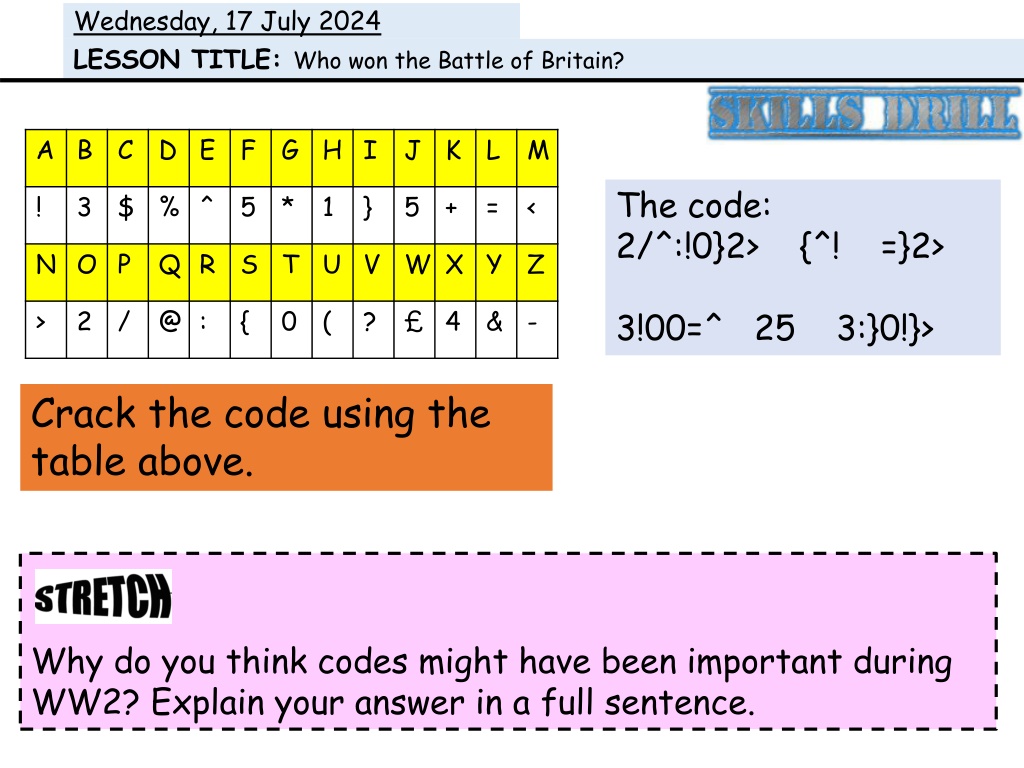

![READ⚡[PDF]✔ European Mail Armour: Ringed Battle Shirts from the Iron Age, Roman](/thumb/20552/read-pdf-european-mail-armour-ringed-battle-shirts-from-the-iron-age-roman.jpg)


